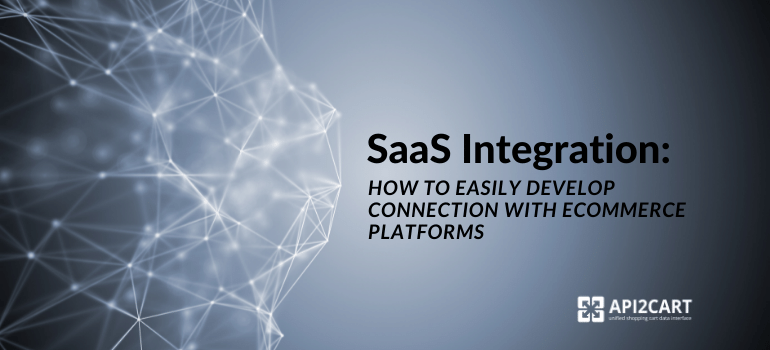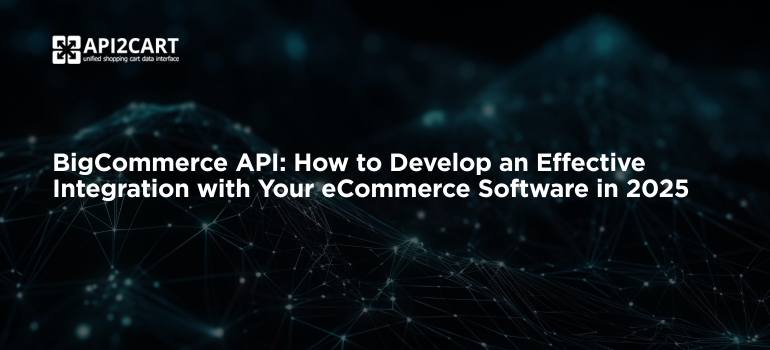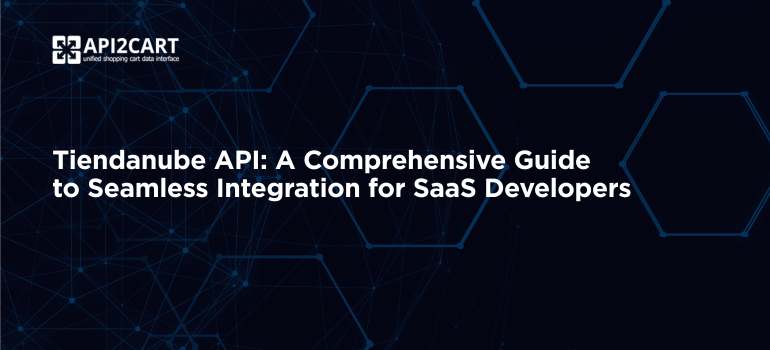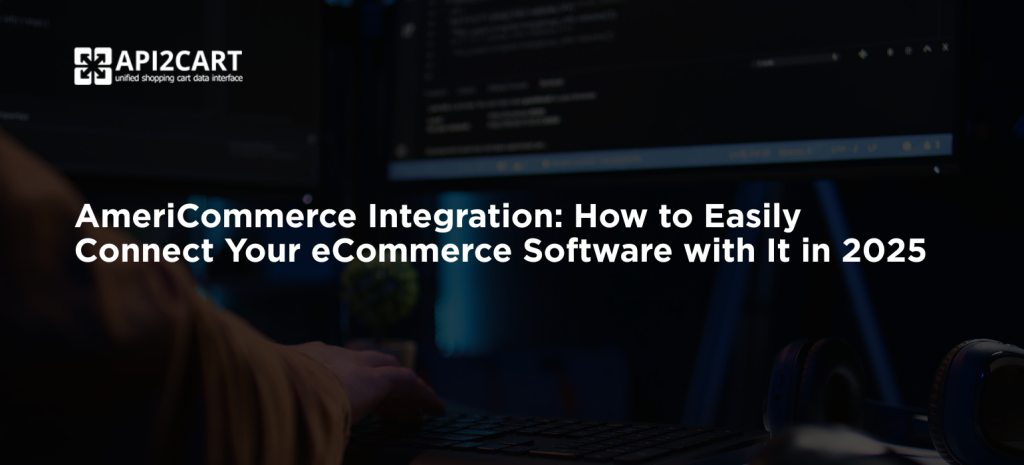
Today’s market is full of SaaS applications such as warehouse management, shipping, marketing automation software and many others. Such a wide variety of SaaS tools is understandable since eCommerce counts around 24 million online stores and the number continues to grow.
In this competitive environment, your SaaS app should always be creative, flexible and open to new technologies. One of the ways to gain a larger market share is by adding support for new shopping platforms and marketplaces. The more SaaS integration with eCommerce platforms you support, the higher are the chances to expand your customer base.
Developing integration with eCommerce platforms often comes with pitfalls. In this article, you will learn more about them and a solution for easy and reliable eCommerce integration development.
What is SaaS Integration?
SaaS integration, or SaaS application integration, is the process of connecting a SaaS application with another software or cloud-based app through APIs. As a result, the app can request and share data freely with the other system.
Without such integration, software providers have to manually enter the data from one system to another and that can be time-consuming and error-prone.
Here is how SaaS integration works in the eCommerce industry:
Once an online store owner decided to place its products on different channels, he or she should be able to receive and send real-time inventory information. Using eCommerce software they can get and manage such information with ease. But for eCommerce software, the challenge is to establish an integration with eCommerce platforms. Such a connection is vital for such software to perform its basic functions.
eCommerce Integration for B2B SaaS Companies
All the features that SaaS applications offer cannot be realized without real-time management of orders, products, customers, etc, and especially B2B SaaS integration with eCommerce platforms.
PIM systems
For instance, PIM systems offer a single place for processing and arranging product data operations and purchases from eCommerce platforms. PIM software is especially useful for multichannel commerce and dropshipping, as product information must be modified in real-time across many shopping channels. Managing product information entails real-time connection to every single store data, such as product details, attributes, images, types, prices, variations, stock levels, customers, and so on. With the help of robust integration with eCommerce platforms PIM systems can access and manage such types of data with ease.
Localization software
If you supply localization software, you must ensure that all information, including product information, categories, images, currencies, time, and date, will be correctly obtained, handled, and integrated. To do this, you need to establish a large number of connections, including those with eCommerce platforms and marketplaces where online merchants operate their online stores. To handle most translation processes in real-time, your localization software should prioritize integration with eCommerce platforms.
Warehouse management software
If you offer warehouse management systems, then you know that your basic functions depend entirely on integration with eCommerce platforms. Such a connection allows your system to retrieve and sync data such as products, orders, customers, etc. As a result, you can offer features like tracking products and organizing warehouse operations, increasing the speed and accuracy of order fulfillment, performing inventory updates, etc.
The importance of SaaS integration with shopping platforms and marketplaces is obvious. However, this process is often quite difficult and time-consuming.
eCommerce Integration Issues

As previously said, if you want to obtain a competitive advantage in the eCommerce industry, then you should integrate with a large number of shopping platforms. Nevertheless, because every platform has its own unique architecture, every integration presents its own set of issues.
When working with numerous SaaS eCommerce platforms, it might take a long time and a lot of experience to understand the logic of every system. Integration with a single eCommerce platform is difficult, but when we speak about connections with many systems, it becomes much more challenging. As a result, most eCommerce SaaS providers have chosen to deal with only a handful of eCommerce platforms, missing out on potential customers and profits.
Integration with eCommerce platforms raises many challenges, some of which are listed below:
Integrating on your own is not a good option as you may not know all the technical intricacies of a particular eCommerce platform. To complete such a project, you must recruit a highly competent development team.
Integration is a difficult process that requires constant struggle, experience, and expertise. A particular integration can take about a couple of months to complete. You can then estimate how long it will take developers to make multiple connections with different eCommerce platforms and marketplaces.
Deploying new versions may be the biggest hurdle for multiple integrations with many eCommerce platforms. Your developers may have created connections based on older versions of eCommerce systems. As a result, you may encounter certain difficulties when trying to get newer instances of online store data.
All of these factors make SaaS API integration with eCommerce platforms difficult, so it's important to find a way to make this process easier.
Easy Way to Develop SaaS Integration with eCommerce Platforms
The easiest way to connect with multiple eCommerce platforms is by using an iPaaS solution like API2Cart. It provides a unified API to integrate over 40 shopping platforms and marketplaces such as Magento, Shopify, PrestaShop, eBay, Amazon and many others. As a result, your SaaS app will get, add, update and sync different store data like orders, products, shipments, customers, categories, etc.
API2Cart offers both static and interactive documentation and useful connection guides to make integration a simple process. 100+ API methods will help you to work with different store data entities. You can test our functionality and see if it meets your business needs by using
Moreover, we are constantly adding new features and support of new eCommerce platforms to satisfy our customers requirements.
From startups to high-volume enterprises can use API2Cart as it offers flexible pricing options. For example, Enterprise On-Premise pricing plan allows you to take full control over the integration process, as API2Cart will be implemented in your business system. Besides, you can choose the desired platform for using the service such as Amazon Web Services, Google Cloud, Microsoft Azure or your own server.
If you have any questions about how API2Cart works, please feel free to contact us. We will be happy to answer you in any form: email, phone or chat.
FAQs
Instead of building separate integrations for each platform, API2Cart allows you to manage all your integrations through a unified API, saving you time and effort in development and maintenance.
1. Sign up for API2Cart: Create an account to access the API.
2. Choose eCommerce platforms: Select the platforms you want to integrate with (Shopify, Magento, WooCommerce, etc.).
3. Get API keys: Obtain the API keys for the platforms you want to connect to.
4. Use API2Cart’s API: Call the API2Cart endpoints to retrieve, update, and sync data across the platforms.
5. Set up authentication: Use the provided API keys to authenticate and ensure secure communication between your SaaS solution and eCommerce platforms.
6. Test the integration: Ensure data flows smoothly between your SaaS solution and the eCommerce platforms.
7. Deploy: Once tested, go live with the integration, allowing your solution to connect with multiple eCommerce platforms efficiently.
API2Cart handles all the complexities, making eCommerce integration powerful, seamless, and reliable.



